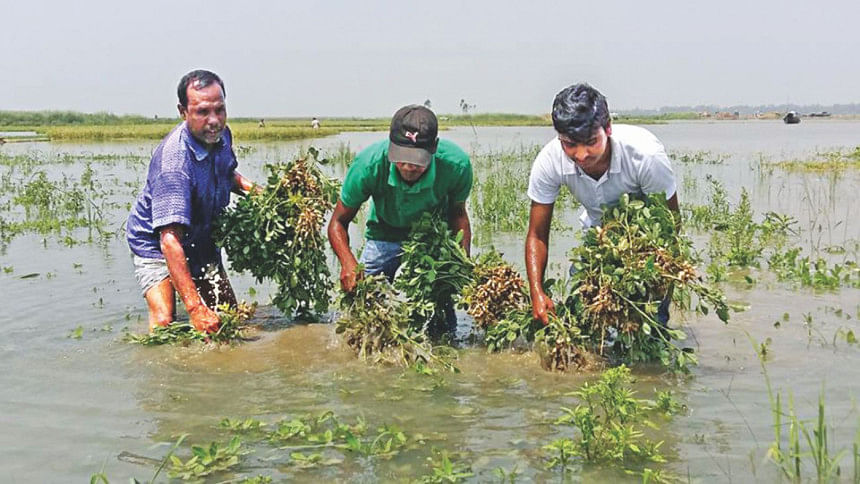Flood grips Chalan Beel

Early flooding hit Natore's Chalan Beel area yesterday, submerging standing Boro crops on around 1,500 hectares of land.
The blow to beel farmers comes at a time when at least six lakh tonnes of Boro paddy were lost to flashflood that struck the country's northeastern haor regions at the end of last month.
Fed by heavy rains, the Atrai river overflowed and flooded Chalan Beel, breaching the protection embankments in Natore's Beeldahar and Bakhtiarpur areas, said Shudhangshu Kumar Sarkar, executive engineer of Water Development Board (WDB) in the district.
The water level of the river has been on the rise since Monday, he added.
Quoting Singra upazila Chairman Shafiqul Islam Shafiq, Upazila Nirbahi Officer Nazmul Ahsan said around 1,500 hectares of cropland were affected.
With the help of the WDB and the upazila administration, farmers are trying to repair the embankments and sluice gates in Bakhtiarpur and Jormollik areas of the upazila.
According to statistics of the Department of Agricultural Extension (DAE), crops have been cultivated on 37,200 hectares of land in the Chalan Beel area this year.
Chalan Beel is a vast low-lying area in the lower Atrai basin, and spreads across Singra and Gurudaspur upazilas in Natore, Chatmohar, Bhangura and Faridpur in Pabna, and Ullahpara, Raiganj and Tarash upazilas in Sirajganj.
It consists of a large number of beels connected to each other by many channels forming an unbroken water body in the rainy season.
Abdur Razzak, a farmer at Natore's Parkoil village, said floodwater damaged his 11 bighas of cropland.
"I'm helpless… All I can do is watch standing crops go under water,” he said.
Another farmer in the same area, Solaiman Ali, said he had taken loans from different non-governmental organisations for cultivating crops. But now all his crops were damaged by floodwater.
Kader Ali, a farmer at Beeldahar village, said paddy on his 32 bighas of land went under water. "I couldn't cut the paddy due to the shortage of labourers."
Expressing frustration at the shortage of labourers, Abu Sayed, a farmer of Krishnanagar village, said, “We are facing difficulties in finding labourers to cut paddy… Normally, they charge Tk 300 to Tk 400 for a day's work. But now they are asking for Tk 700 to Tk 800.”
TEMPORARY MIGRATION
Losing the only crop of the year -- Boro -- many people from Sunamganj's flood-hit haor areas are temporarily migrating to towns and cities in search of livelihood.
Fifty-five-year-old Badshah Mia from Bhati Tahirpur village used to work at paddy fields in the Boro season and fish for the rest of the time of the year.
But he had to leave home after flashflood hit Sunamganj hard. He is now staying in the capital to earn a living.
Like him, Jahirul Haque and his brother Shahidul Haque left their village home in Bishwambarpur upazila in search of work.
“We used to work at rice mills during this season. Since crops in the area are damaged, we don't have any hope of getting jobs at the mills”, Jahirul said.
“We have a big family to look after… Now we have no option but to pull rickshaws in the capital to earn a livelihood,” he added.
Migration of people from haor areas to big towns and cities in search of work is not unusual, but such migration in the harvest season is abnormal and alarming, say locals and rights activists.
Nantu Lal Das, former vice-chairman of Sunamganj's Shalla upazila, said at least a thousand people from the upazila already left their homes in search of work.
It's alarming and a sign of severe crisis in the area, he said.
“They don't have any food at home, and Boro crops are gone. They have not yet got any support from the authorities. They can't find any work here. Now, they are leaving their homes to find work”, he told this newspaper.
Rafiqul Islam Talukdar, chairman of Dhanpur union in Bishwambarpur upazila, said many people in his union had already left their homes to find work.
Moreover, many farmers are burdened with loans from NGOs, banks or local lenders, and it's impossible for them to repay those this year.
“I took a loan from a local lender to cultivate Boro on 10 acres of land. But I have lost all the crops and I cannot repay my loan,” said Intiaj Mia of Shaktiarkhala village while leaving his home for the capital yesterday.
“The lender is putting pressure on me to repay the loan. I need to earn for clearing my debt and also for my family,” he added.
Visiting the launch terminal in Sunamganj town yesterday, The Daily Star correspondent found that hundreds of people were arriving there from many remote villages. Most of them were travelling to either Sylhet or the capital.
LOSS OF CATTLE
For Lulu Mia, it was nothing short of a disaster.
First, the farmer at Sunamganj's Batakandi village lost crops on eight acres of land to flashflood in Nandail haor. And then, six of his seven buffaloes died in a span of two days.
The buffaloes suddenly fell sick and died, said Lulu's cousin Golam Mostafa.
Two cows also died at Bhukhali village in Jagannathpur upazila yesterday.
Meanwhile, blood samples of the six dead buffaloes were sent to the divisional livestock laboratory to ascertain the cause of their death, Md Gias Uddin, deputy director of Sylhet Livestock Department, told this newspaper.
[Our Natore, Sylhet and Moulvibazar correspondents contributed to this report]

 For all latest news, follow The Daily Star's Google News channel.
For all latest news, follow The Daily Star's Google News channel. 



Comments